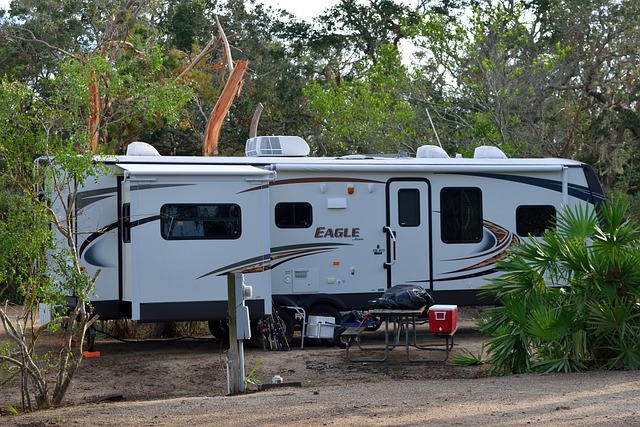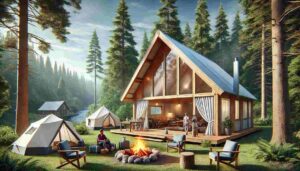Living in a stationary RV, also known as full-time RV living or stationary RV living, has gained popularity in recent years as an alternative lifestyle choice. This unique way of living offers individuals and families the opportunity to embrace a nomadic lifestyle while enjoying the comforts of a home on wheels. However, like any lifestyle choice, there are pros and cons to consider before embarking on this adventure.
Understanding the pros and cons of stationary RV living is crucial to making an informed decision. In this comprehensive article, I will unveil the various aspects of stationary RV living, covering everything from affordability and flexibility to the challenges of limited space and maintenance. Through expert analysis and real-life examples, we aim to provide you with valuable insights and help you assess whether stationary RV living is the right fit for you.
As you read through this article, you will gain knowledge and expertise in the subject to balance the view of the pros and cons. So, let’s dive in and explore the exciting world of stationary RV living, starting with the advantages it offers.
Pros of Stationary RV Living
Living in a stationary RV can significantly reduce living expenses compared to traditional housing. Here are some specific advantages:
- Lower living expenses: Stationary RV living typically involves lower monthly costs for rent or mortgage payments. RV parks and communities often offer affordable rates compared to traditional housing options.
- Minimal utility bills: RVs are designed to be self-contained and equipped with water, electricity, and sewage systems. By utilizing RV park hookups or alternative energy sources like solar panels, you can reduce or even eliminate utility bills.
- Potential for cost-saving strategies: With reduced living expenses, you have the opportunity to save money, pay off debts, or invest in other areas of your life, providing financial freedom and flexibility.
Flexibility and Mobility
One of the primary attractions of stationary RV living is the freedom it offers. Consider the following advantages:
- Ability to choose a preferred location: You have the freedom to select your desired location to settle down temporarily or long-term. Whether it’s near nature, close to family, or in a bustling city, you can find RV parks and communities that cater to various preferences.
- Freedom to relocate easily: If you crave change or wish to explore different regions, stationary RV living allows you to effortlessly move from one place to another. You can enjoy new surroundings without the hassle of packing and unpacking.
- Opportunity to explore new places: Living in an RV enables you to experience diverse landscapes, cultures, and communities. You can embark on exciting adventures, discover hidden gems, and create memorable experiences along the way.
Minimalistic Lifestyle
Stationary RV living encourages a simplified and minimalistic approach to life. Consider the following advantages:
- Decluttering and simplifying possessions: Living in a compact space requires careful consideration of what you truly need. This lifestyle compels you to declutter and prioritize essential belongings, leading to a more organized and clutter-free living environment.
- Reduced environmental footprint: With limited space and resources, RV living naturally promotes eco-friendly practices. You become more conscious of energy consumption, water usage, and waste generation, contributing to a smaller environmental footprint.
- Enhanced focus on experiences rather than material things: Stationary RV living encourages a shift in mindset towards valuing experiences over material possessions. By embracing a more experiential lifestyle, you can create lasting memories, strengthen relationships, and find fulfillment in the simple pleasures of life.
Sense of Community
Living in an RV park or community fosters a sense of camaraderie and social interaction. Consider the following advantages:
- RV parks and communities: These environments are specifically designed to accommodate RV dwellers, providing a community of like-minded individuals who share similar lifestyles and interests.
- Camaraderie with fellow RV enthusiasts: You have the opportunity to connect with others who have chosen the same lifestyle, fostering friendships and support networks. Engaging with the RV community can lead to valuable connections and shared experiences.
- Shared activities and social events: RV parks often organize various activities, such as potlucks, game nights, and outdoor excursions. These events offer opportunities to bond with neighbors, engage in hobbies, and create a sense of belonging within the community.
By embracing the affordability, flexibility, minimalistic lifestyle, and sense of community that stationary RV living offers, you can embark on a unique and rewarding journey. However, it’s important to consider the potential drawbacks as well. In the following section, I will explore the cons of stationary RV living to provide a comprehensive view of this lifestyle choice.
Cons of Stationary RV Living
While stationary RV living has numerous advantages, it’s essential to consider the potential challenges and drawbacks that come with this lifestyle. Here are some cons to keep in mind:
1. Limited Space
- Challenges with storage and organization: RVs have limited storage space, which can make it challenging to accommodate all your belongings. Downsizing and optimizing storage solutions are necessary to make the most of the available space.
- Adjusting to a smaller living area: Transitioning from a spacious home to an RV requires adjusting to a compact living area. It may take time to adapt to the reduced square footage and find comfort in a smaller space.
- Potential for feeling cramped: The confined space of an RV can sometimes lead to a sense of confinement or claustrophobia, especially during extended periods of inclement weather or when sharing the space with others.
2. Lack of Permanent Address
- Difficulties with mail and legal documentation: Not having a permanent address can create challenges when it comes to receiving mail and important documents. Setting up mail forwarding services or utilizing virtual mailboxes can help address this issue.
- Establishing residency for certain purposes: Some legal and administrative matters, such as driver’s licenses, vehicle registrations, and voter registration, may require a permanent address. Navigating these requirements can be more complicated when living in an RV.
- Impact on personal and professional relationships: Living in a stationary RV may require explaining and justifying your lifestyle choices to friends, family, and colleagues. It’s essential to be prepared for potential misunderstandings or judgment from others.
3. Dependency on RV Park Facilities
- Reliance on shared amenities: While RV parks often offer amenities such as laundry facilities, shower houses, and recreational areas, you may encounter situations where these facilities are crowded or temporarily unavailable.
- Noise and privacy concerns: RV parks can be lively and bustling, with neighbors in close proximity. This proximity may result in noise disturbances and limited privacy compared to living in a traditional home.
- Restrictions imposed by RV park rules and regulations: Each RV park has its own set of rules and regulations that residents must abide by. These restrictions can limit personalization of your space, pet ownership, and other aspects of daily life.
4. Maintenance and Repairs
- Cost and effort involved in maintaining an RV: RVs require regular maintenance to ensure they remain in good working condition. From routine inspections to repairs and upgrades, the cost and effort associated with maintaining an RV should be considered.
- Dealing with unexpected breakdowns: Like any vehicle, RVs are susceptible to mechanical issues and breakdowns. Being prepared for unforeseen repairs and having access to reliable repair services can help mitigate these challenges.
- Finding reliable repair services while on the road: Locating trustworthy repair services, especially when you are traveling or in unfamiliar areas, can be challenging. It’s important to research and establish a network of reliable repair shops along your travel routes.
While the challenges may be significant, with proper planning and realistic expectations, many people successfully navigate and overcome these obstacles. Next, I will provide expert advice to help you thrive in stationary RV living.
Expert Advice for Successful Stationary RV Living
To make the most of your stationary RV living experience and overcome potential challenges, here are some expert tips and advice:
1. Thorough Research and Planning
- Selecting the right RV and floor plan: Before committing to stationary RV living, research different types of RVs and floor plans to find the one that best suits your needs and lifestyle. Consider factors such as size, layout, amenities, and storage capacity.
- Choosing an appropriate RV park or community: Research and visit multiple RV parks or communities to find the one that aligns with your preferences. Consider factors such as location, amenities, park rules, and reviews from other residents.
- Understanding local regulations and restrictions: Familiarize yourself with the local regulations and restrictions that may impact your stationary RV living, such as zoning laws, length of stay limitations, and building codes.
2. Financial Considerations
- Budgeting for ongoing expenses: Create a realistic budget that accounts for monthly RV park fees, utilities, insurance, maintenance, and other living expenses. Factor in unexpected costs and allocate funds for savings and emergency expenses.
- Emergency funds for repairs and maintenance: Establish an emergency fund specifically for RV repairs and maintenance. Having a financial cushion will help alleviate stress when unexpected repairs arise.
- Exploring insurance options for RV living: Consult with insurance providers specializing in RV coverage to ensure you have adequate insurance for your RV and its contents. Consider comprehensive coverage that includes liability, personal property, and emergency roadside assistance.
3. Creating a Comfortable Living Space
- Smart storage solutions and organization tips: Maximize storage space by utilizing innovative storage solutions such as collapsible containers, hanging organizers, and under-bed storage. Optimize organization by assigning dedicated spaces for different items.
- Utilizing multi-functional furniture: Choose furniture that serves multiple purposes, such as sofa beds with built-in storage or dining tables that can be folded down when not in use. This helps maximize functionality in a limited space.
- Personalizing the RV to make it feel like home: Decorate and personalize your RV to create a cozy and inviting atmosphere. Use colors, textiles, and decor that reflect your personal style and make the space feel uniquely yours.
4. Building Relationships and Engaging in Community
- Participating in RV park activities and events: Take part in organized activities and events within the RV park or community. Engaging with fellow residents fosters a sense of community and provides opportunities for socializing and making connections.
- Networking with fellow RV enthusiasts: Join RV forums, social media groups, or attend RV rallies to connect with other RV enthusiasts. Sharing experiences, tips, and knowledge can enhance your stationary RV living journey.
- Sharing knowledge and experiences with others: If you have expertise or insights to offer, consider starting a blog or YouTube channel where you can share your stationary RV living experiences. This can establish you as a trusted resource within the RV community.
Remember, every individual’s experience is unique, and finding what works best for you is key to a successful and rewarding stationary RV living journey.
Conclusion
Stationary RV living offers a unique and exciting lifestyle with numerous advantages, including affordability, flexibility, minimalism, and a sense of community. However, it’s important to consider the potential drawbacks, such as limited space, lack of a permanent address, reliance on RV park facilities, and maintenance challenges.
By thoroughly researching and planning, considering financial aspects, optimizing your living space, and actively engaging in the RV community, you can navigate the challenges and make the most of your stationary RV living experience. It’s crucial to weigh the pros and cons based on your personal preferences, lifestyle, and goals.
Ultimately, stationary RV living provides an opportunity for adventure, exploration, and a simplified way of life. It requires a mindset open to embracing change, adapting to new surroundings, and finding joy in the journey rather than the destination.
Make an informed decision, taking into account your desires, needs, and willingness to embrace the challenges and rewards that come with stationary RV living. By doing so, you can embark on a remarkable journey filled with memorable experiences, personal growth, and a deep connection with the world around you.
Remember, the choice to live in a stationary RV is a personal one, and with the right preparation and mindset, it can be a fulfilling and enriching lifestyle choice. Embrace the adventure, be open to new possibilities, and enjoy the freedom and flexibility that stationary RV living can offer.
Safe travels and happy living!










